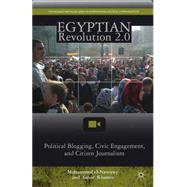
What is included with this book?
Mohammed el-Nawawy is a Knight-Crane endowed chair and associate professor in the Knight School of Communication at Queens University of Charlotte. His areas of expertise and research interests are focused on the new media in the Middle East, particularly satellite channels and the Internet, and their impact on the Arab public sphere. He is the author and co-author of four books: Islam dot Com: Contemporary Islamic Discourses in Cyberspace (Palgrave Macmillan, 2009); Al-Jazeera: The story of the network that is rattling governments and redefining modern journalism (Westview Press, 2003); Al-Jazeera: How the free Arab news network scooped the world and changed the Middle East (Westview Press, 2002); and The Israeli-Egyptian peace process in the reporting of Western journalists (Greenwood Publishers, 2002). He has also published in several national and foreign journals in the international communication field. He is the founding and senior editor of the Journal of Middle East Media and serves on the editorial boards of Media, War and Conflict, Journalism Education and Global Media. He is also a board member on the Arab-U.S. Association for Communication Educators. He received his Bachelor's and Master's degrees in mass communication at the American University in Cairo. He has a doctorate degree in journalism from Southern Illinois University, Carbondale.
Sahar Khamis is Assistant Professor in the Department of Communication at the University of Maryland, College Park. She is an expert on Arab and Muslim media and the former Head of the Mass Communication and Information Science Department at Qatar University. Dr. Khamis holds a Ph.D. in Mass Media and Cultural Studies from the University of Manchester in England. She is the co-author of the book: Islam Dot Com: Contemporary Islamic Discourses in Cyberspace (Palgrave Macmillan, 2009) and authored chapters in the books Women and Media in the Middle East: Power through Self-Expression (I.B. Tauris, 2004), and New Media and the New Middle East (Palgrave Macmillan, 2007). She has several publications in both international and regional academic journals and conferences in both English and Arabic. She is the recipient of a number of prestigious academic and professional awards.
| Blogging as Cyberactivism: Introductory Themes | |
| Political Blogging: (Re)Envisioning Civic Engagement and Citizen Journalism | |
| The Arab Political Blogosphere: The Case of Egypt | |
| Blogging against Violations of Human Rights | |
| Blogging against Limitations on Freedom and Democratic Practice | |
| Concluding Remarks and Future Directions | |
| Table of Contents provided by Publisher. All Rights Reserved. |
The New copy of this book will include any supplemental materials advertised. Please check the title of the book to determine if it should include any access cards, study guides, lab manuals, CDs, etc.
The Used, Rental and eBook copies of this book are not guaranteed to include any supplemental materials. Typically, only the book itself is included. This is true even if the title states it includes any access cards, study guides, lab manuals, CDs, etc.